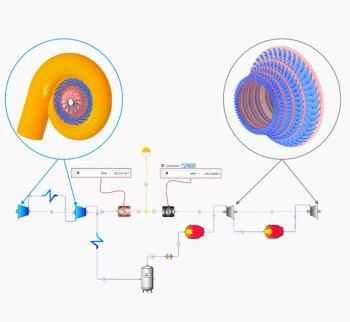
UPGRADING TURBINE LUBRICATION TO REDUCE TCO
THE SELECTION AND MANAGEMENT OF TURBINE OILS
IS CRITICAL TO THE AVOIDANCE OF DOWNTIME
BY DR. VOLKER NULL
Today’s power generation turbines are working under more demanding conditions than ever — from continuous 24/7 running to frequent stop-start cyclic operation. Turbine oils must be able to cope with difficult requirements, such as heavy stress, the need to reduce downtime, extended oil-drain intervals, hotter temperatures and higher loads. Greater turbine output power, combined with lubricant reservoirs of the same size or smaller, is also imposing more rapid cycle times on lubricants, resulting in the need for optimized surface properties.
The ratio of megawatt output to oil volume gives a good indication of oil stress. The latest machines are seeing increases of up to 400% in oil stress. This impacts the types of lubricants required by power generation customers. Whether gas, steam or hydroelectric turbines, the number of rapidly rotating metal surfaces generates high temperatures that can cause protective oils to degrade. This opens the door to metal-to-metal contact and abrasive wear.
The type of turbine, along with operating conditions and lubricant quality, can affect the frequency of oil changes. Steam turbines run under high temperature and moist operating conditions. Gas turbines run under hotter temperatures, but typically without moisture. In the past, different turbine oils were developed for each application.
Lubricant developments
Developments in base oil technology have been achieved with the gas-to-liquid (GTL) process. Production of Shell GTL base oils begins with gasification, where the methane from natural gas reacts with pure oxygen to produce synthesis gas. The synthesis gas is fed through a reactor and converted to a liquid called syncrude. The liquid is fed into a hydrocracker to break down molecules and form new ones and the new molecules are distilled into GTL base oils for use in finished lubricants.
The result? The GTL process transforms natural gas into liquid and solid hydrocarbons with high purity. Pure hydrocarbon base oils are created with a narrow molecular distribution, a high viscosity index and a low level of contaminants (such as nitrogen and sulfur). These GTL base oils respond well to performance additives, enabling the production of turbine oils with good performance even under severe operating conditions.
Compared with conventional mineral oil-based turbine oils, this new class of lubricants slows down the rate of oxidative and thermal degradation. In addition, these oils release air faster, resist foaming and separate water more rapidly. They also minimize the formation of oil-insoluble degradation products, such as varnish that can deposit on valves and filters and prevent the turbine from starting.
GTL-based turbine oils typically exceed original equipment manufacturer (OEM) specifications. They can offer high performance, enhanced asset reliability and the potential for turbine life extension. Users report significant Total Cost of Ownership (TCO) savings over the lifetime of the equipment compared to traditional lubricants. Even with a high-quality GTL oil, however, contamination control remains a vital ingredient.
How the lubricant is stored, handled and transported through the site impacts the likelihood of contamination. Storing drums in a sheltered place and wiping the top clean before it is opened will help limit the risk of contamination by water and particles. Filtration can also help to ensure product cleanliness before oil enters the equipment. Regular lubricant monitoring and analysis is another way to keep the lubricant functioning well and fit for purpose. It can provide early warning of turbomachinery malfunction, wear or lubricant degradation. The lubricant can then be changed before issues escalate. Operators are advised to pay attention to lubrication management best practices, including monitoring, analysis and staff training.
Author: Dr. Volker Null is Shell Global Product Application Specialist, Turbine Oils. For more information visit www.shell.com/lubricants
Newsletter
Power your knowledge with the latest in turbine technology, engineering advances, and energy solutions—subscribe to Turbomachinery International today.




